The best trail running socks: comfort and support on uneven ground
Our pick of the best trail running socks, tested for protection and comfort for your off-road adventures
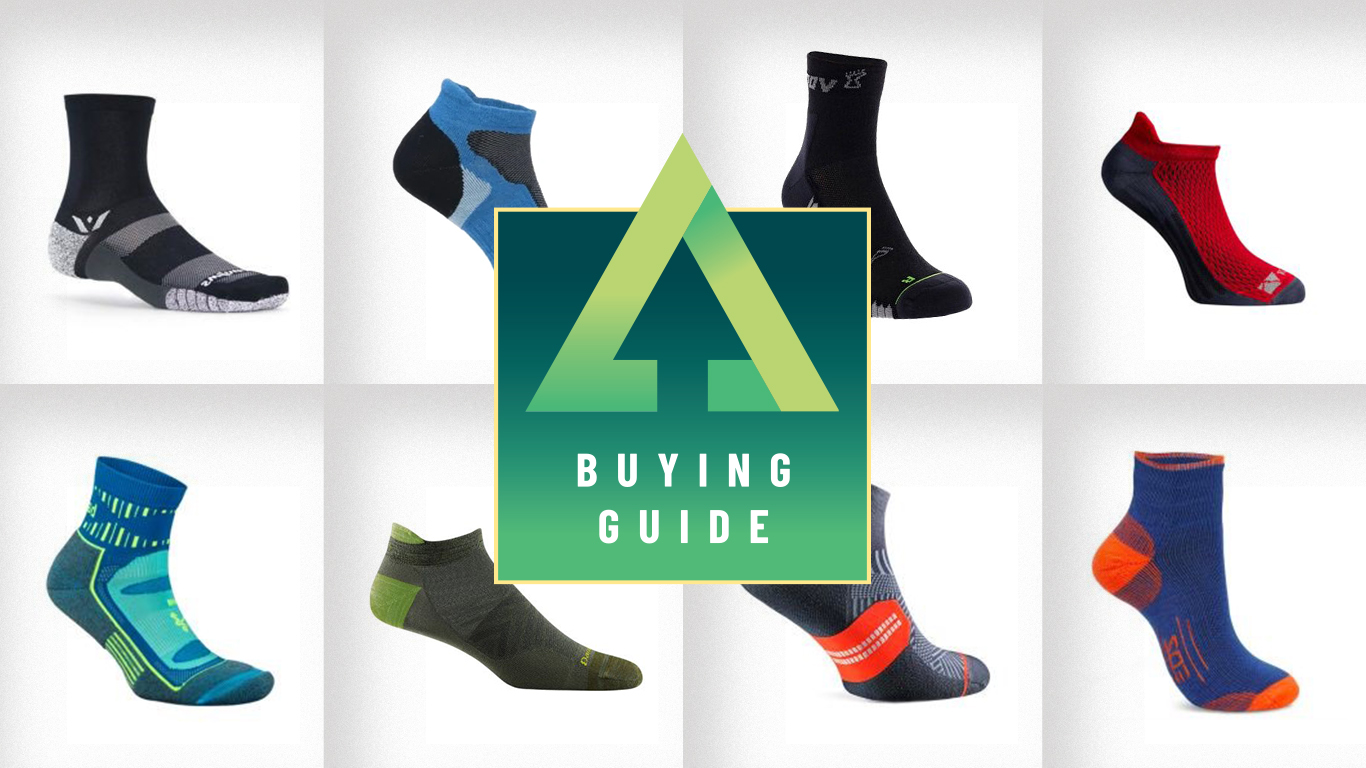
All the latest inspiration, tips and guides to help you plan your next Advnture!
You are now subscribed
Your newsletter sign-up was successful
It's easy to underestimate the importance of having the best trail running socks for your backcountry escapades. A trail runner's feet see a whole load of action and it's unsurprising that a lot of thought goes into wearing the optimum pair of trail running shoes for the terrain and conditions ahead. However, it's your socks that get most intimate with your feet during a run.
The best trail running socks provide cushioning, support, moisture wicking capabilities and protection for your feet, reducing the chance of injury and of getting dreaded blisters. Often featuring a zoned construction, providing stretch and support where your foot needs it most, as well as breathable regions to allow moisture to escape, a well-engineered trail running sock is quite a thing to behold.
Our expert reviewers have hit the trails, sliding these excellent pairs into their best trail running shoes to appraise them against the claims made by the manufacturers. For us, the best trail running socks overall are the Darn Tough No Show Tab socks, which are made to last with lightweight merino wool that resists odors, and won't rub even on long runs. Read on for more details, and for the rest of our top recommendations.
The quick list
This is a snapshot of the best trail running socks available in 2026. To delve deeper into the features and qualities of each featured pair, see our more detailed reviews further down the page in this guide.
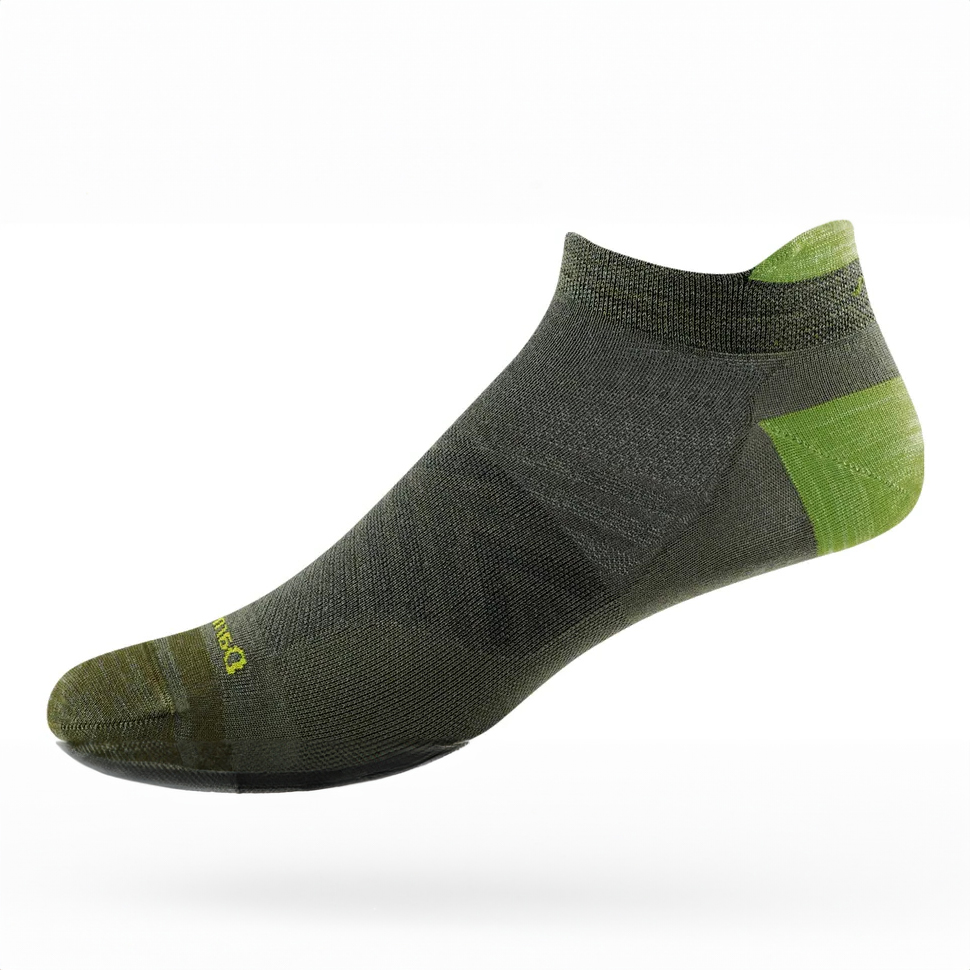
On test, we found that this well-made sock offers and comfort in equal measure, as well as Darn Tough's usual durability. It's our top recommendation, particularly if you're going long.
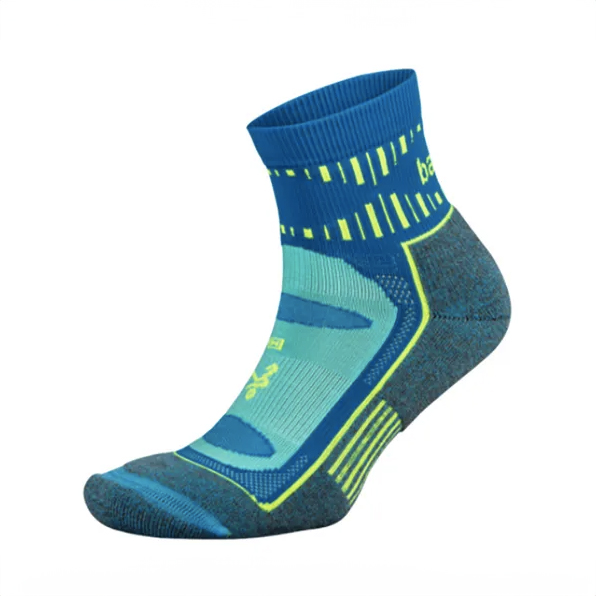
These socks are supremely soft and comfortable, made using sustainably sourced South African mohair. We found they provided excellent protection from blisters, even over long distances.
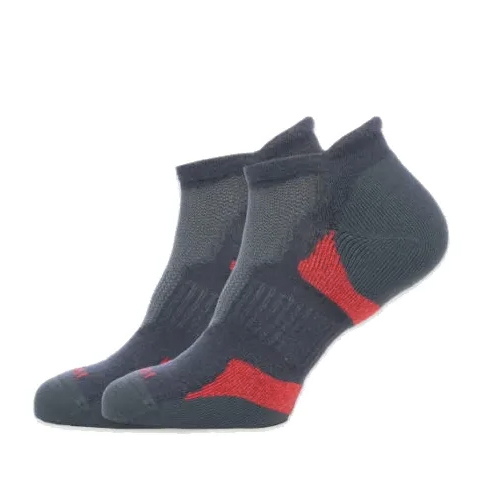
We found BAM's Technical Bamboo Running socks soft, but hard-wearing. Breathable and light, they work well for summer walking as well as mixed-terrain runs in warm weather.
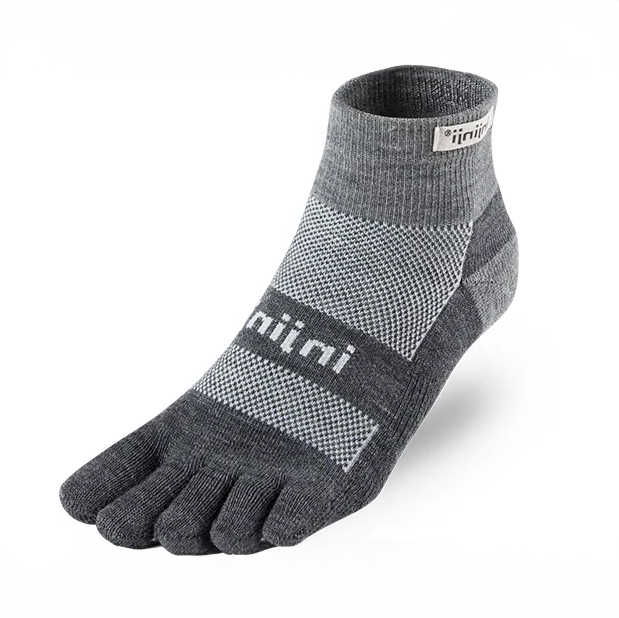
Although they take a minute to put on, we like the Injinji Outdoor Midweight Crew NuWool Toe Socks for their supreme comfort.
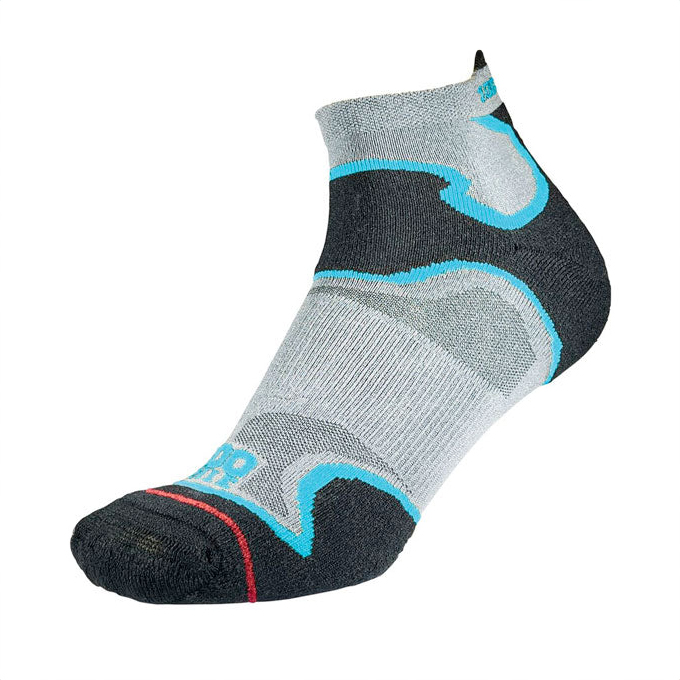
Double-lined and well-padded, we found that the 1000 Mile Fusion Socklet Repreve 2024s are comfortable running on all kinds of terrain
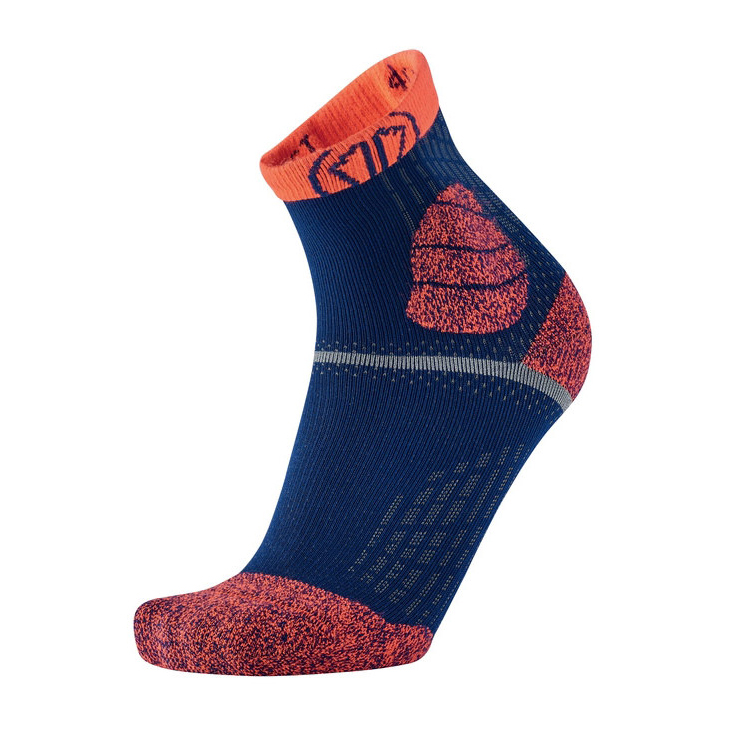
We're big fans of this grippy sock that stays put around your foot and in your shoe to help prevent blisters on long runs and hikes.
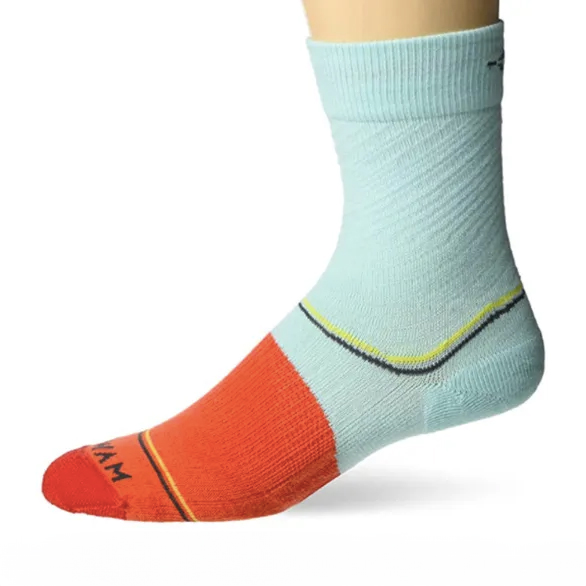
This comfortable sock has a special construction that cups your heels and supports your arches with gentle compression.
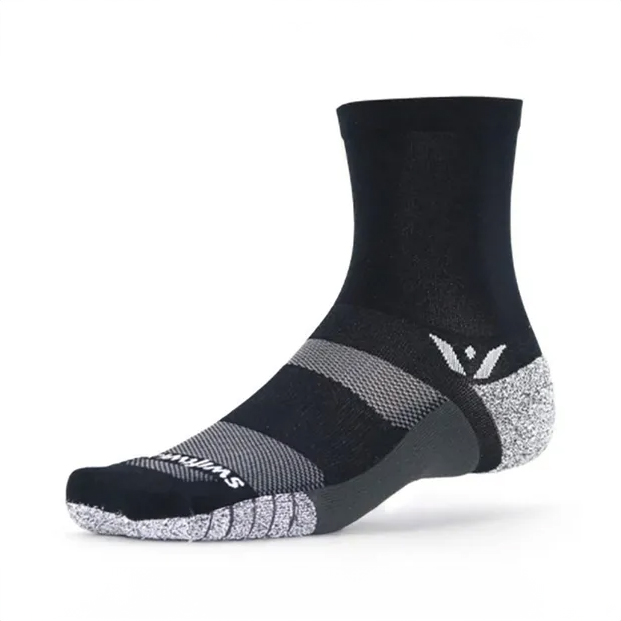
These minimalist-looking, but highly supportive little socks are lightweight, breathable, and ideal for scampering around trails in summer.
The best trail running socks 2026
You can trust Advnture
The best trail running socks overall
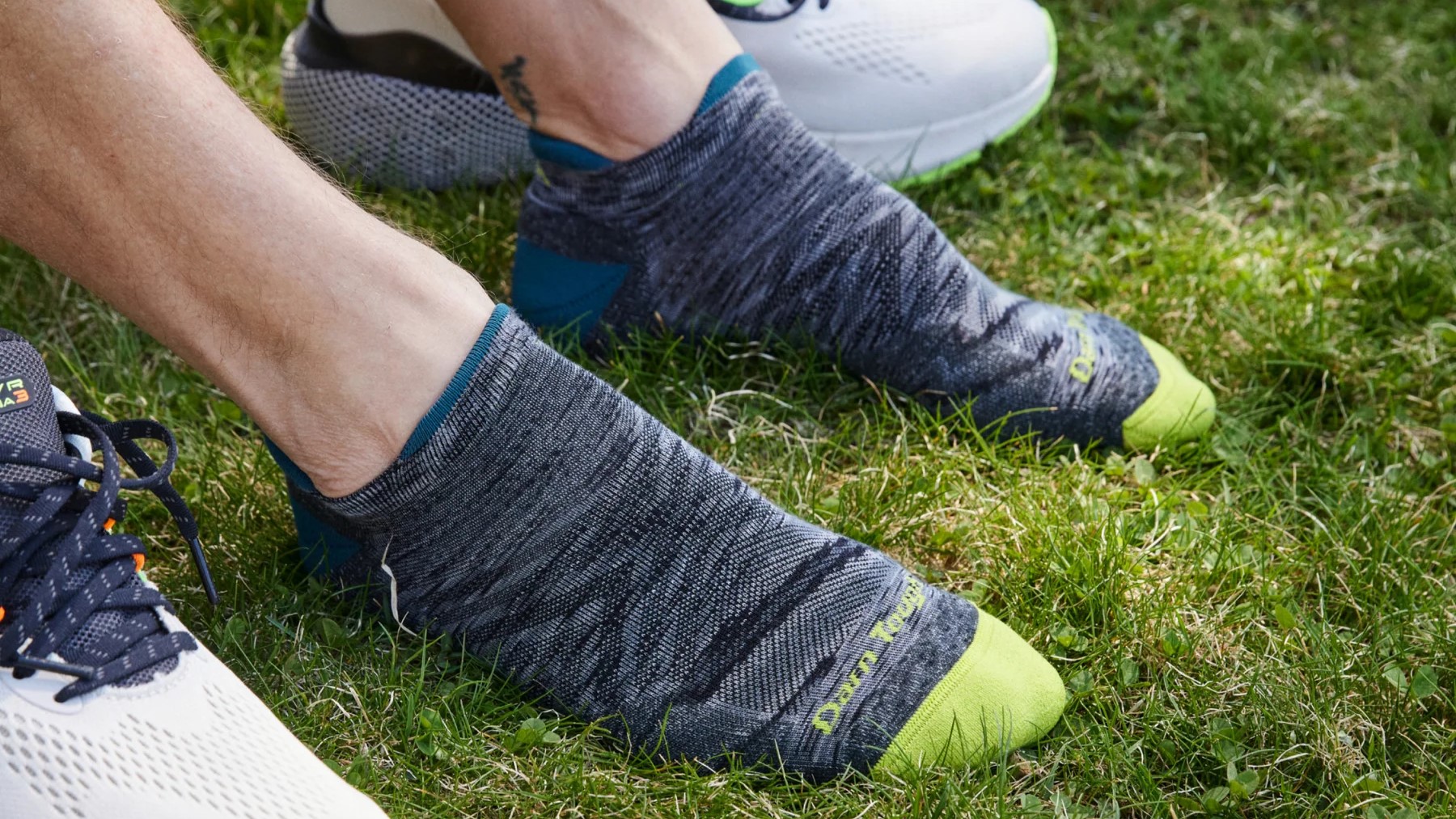
Specifications
Reasons to buy
Reasons to avoid
Unless you’re wearing a extremely low profile running shoe, you won’t really see these trail running socks (as suggested by the name), so they won’t shield you from things like stinging plants, brambles or ticks, and are better suited to the warmer months, but, as we found out on test, there’s lots going on beneath the surface.
The design and fine-gauge knitted material cradles the foot really well, regardless of the lack of left/right specificity, and the seams are entirely undetectable. Once pulled on, they stay firmly in place. As Darn Tough proudly proclaim every chance they get, their socks are still made in Vermont, and they are crafted with lots of attention to detail and the high level of quality control is obvious. The socks are available as either a cushioned or non-cushioned version, so consider the conditions you plan on running in before making your choice. To summarize, our running expert Pat asserts that "these near-as-damn-it half-Merino socks offer performance and comfort in equal measure".
Read our full Darn Tough No Show Tab Socks review
The best anti-blister trail running socks
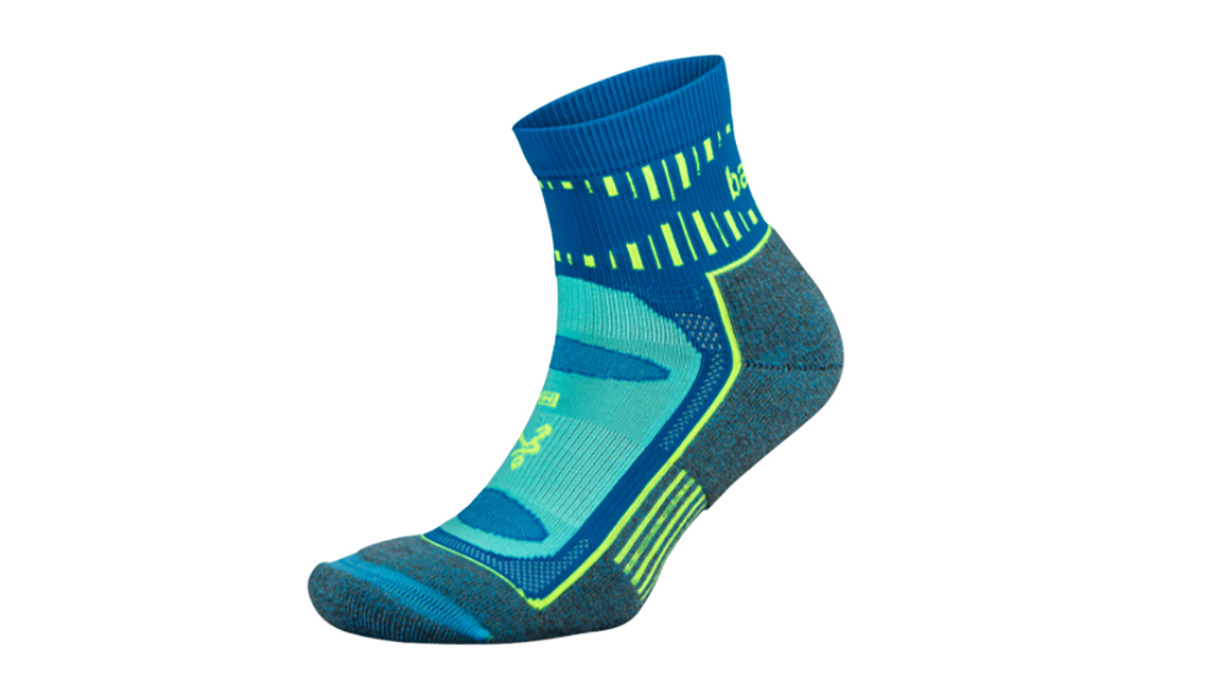
2. Balega Blister Resist Quarter Running Socks
Our expert review:
Specifications
Reasons to buy
Reasons to avoid
Balega’s Blister Resist Quarter socks combat friction and other blister-causing factors with a smart design and a blend of materials that keeps the sock in place and ensured our skin remained dry and cool. These socks have a deep, form-fitting heel pocket, a snug, elastic ankle cuff, form-fitting arch support and a seamless toecap.
One of the key materials in the sock’s blend is South African mohair, a sustainable natural fiber made from Angora goat hair that’s long been known for its durability, softness, stretchiness and antimicrobial qualities. It’s a hollow-structure fiber that delivers superior temperature regulation, which our tester Pat found "provided warmth when it was cold and a cool sensation when it's warm". The other key material in the makeup of these socks is Drynamix, an elastic synthetic fiber with exceptional moisture-wicking capabilities. The quarter cuff height does a good job at keeping dirt and pebbles out.
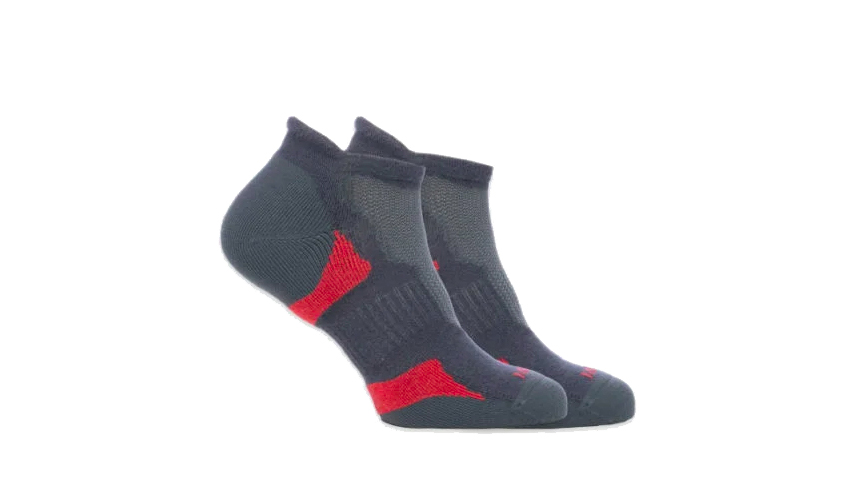
3. BAM Technical Bamboo Running Socks
Our expert review:
Specifications
Reasons to buy
Reasons to avoid
We found that these new ankle-length technical running socks from British bamboo clothing brand BAM are excellent performers on any sort of surface. Instantly comfortable, they feature additional terry lining for extra padding and there’s a mesh section at the toes for better breathability and ventilation. The socks are nicely shaped and designed to provide some support in the arch area and there is a bit more cushioning on the heel too, which helps avoid niggles around the Achilles area. They are not the cheapest socks out there, but the material mix is a particularly rich one.
It begins with a bamboo base that’s not only an excellent eco-friendly fabric (being natural and biodegradable), but is also "super comfortable" according to our tester, keen trail running expert Pat. This is combined with Merino wool and majority-recycled poly materials, with a bit of dynamic elastane thrown in to help it keep its shape. The result is "a sock that’s a joy to wear, which performs brilliantly, resists residual odors, lasts for a decent amount of time and yet is still biodegradable at the end of its useful life".
The raw material sourcing and production process for bamboo clothes is also much less environmentally damaging and water-heavy than the manufacturing methods for man-made clothes. These are short socks, however, so they don’t offer much protection from stinging and prickling plants on overgrown trails.
The best trail running socks for comfort
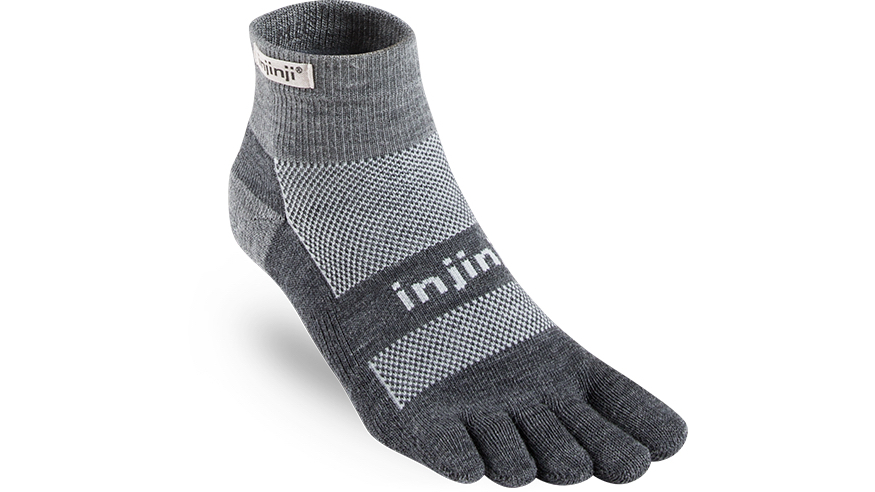
4. Injinji Outdoor Midweight Crew NuWool Toe Sock
Our expert review:
Specifications
Reasons to buy
Reasons to avoid
Injinji pioneered the toe sock, and we have been wearing various iterations of this sock for over eight years now, and have always been very impressed with the performance. With your toes being separated from one another, the level of skin-on-skin rubbing is reduced, massively lowering the risk of blisters in this potentially problematic area. This design also lets your feet and toes move in the way they are supposed to (natural splay), albeit within the confines of a shoe (obviously if your running shoe has a narrow toebox, this won’t work as well). Depending on your feet, it can take some time to get these on properly, but "the comfort levels make it worthwhile" according to Pat, our reviewer.
Arguably, a toe sock is slightly less warm than a normal sock – just as gloves aren’t as warm as mittens – but the Nuwool fabric used in these trail running socks has excellent thermal properties. Other features include midweight padding cushions, and some arch support. The cuff is designed to stay firmly in place, keeping out dirt and debris from the trail. A large area of mesh across the forefoot allows air to the feet – it will be interesting to see how durable this element is, but we have run 50km-plus in them, washing them after each outing, and haven’t noticed any concerning issues yet. In fact, they seem extremely robust.
The best trail running socks for mixed terrain
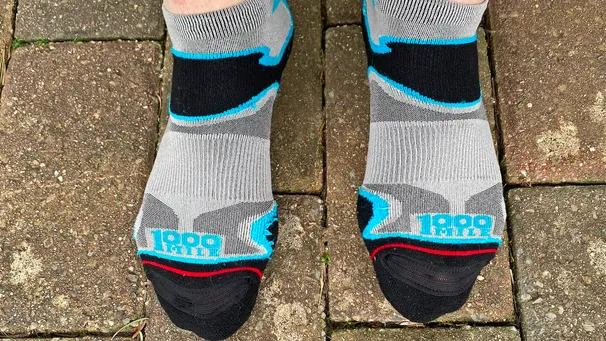
Specifications
Reasons to buy
Reasons to avoid
This excellent, double layered sock is blister resistant and features well-thought through padding and zoned construction to deliver comfort, cushioning and stability. We found that this makes it ideal for tackling all kinds of terrain, from gravel tracks to uneven rocky ridges. Our tester, Pat, also valued the ventilated panels, which provided a good level of breathability.
1000 Mile have also ticked the sustainability boxes by crafting these socks using Repreve, a synthetic fabric made from recycled plastic bottles. While the low fit and ventilation here means that they're not socks for winter, Pat asserts that for "most short and mid-length runs in non-freezing conditions, they’re perfect."
Read our full 1000 Mile Fusion Socklet Repreve 2024 review
The best non-slip trail running socks
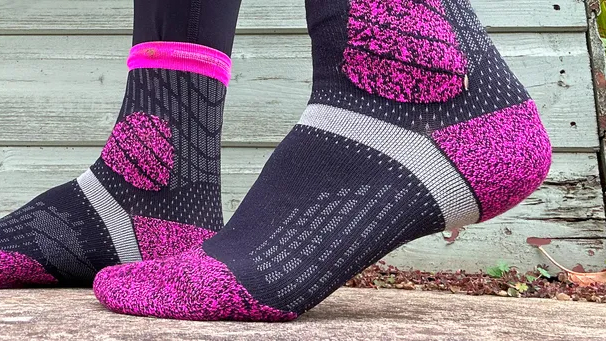
Specifications
Reasons to buy
Reasons to avoid
What undoubtedly sets the Sidas Trail Protect Sock apart is its silicone gripper band. In fact, our trail running expert Claire Maxted went as far as to proclaim this feature to be "genius'. It basically ensures the sock stays in place around the foot, with zero slippage, while also holding your trail shoes for increased security on tricky terrain.
Fit wise, the sock has a slim, responsive feel, while the cushioning at the toes, heel and ankle well thought through. There's venting and support at the arch, which adds to the feeling of comfort we got from these socks on test. Polygiene provides anti-odor qualities, meaning you can wear them over multiple days without them making a pong.
While synthetic, the brand told Claire that the high thread count here ensures durability, thus still making it an environmentally conscious choice, so long as you recycle them at the end of their life.
Read our full Sidas Trail Protect socks review
The best trail running socks for arch support
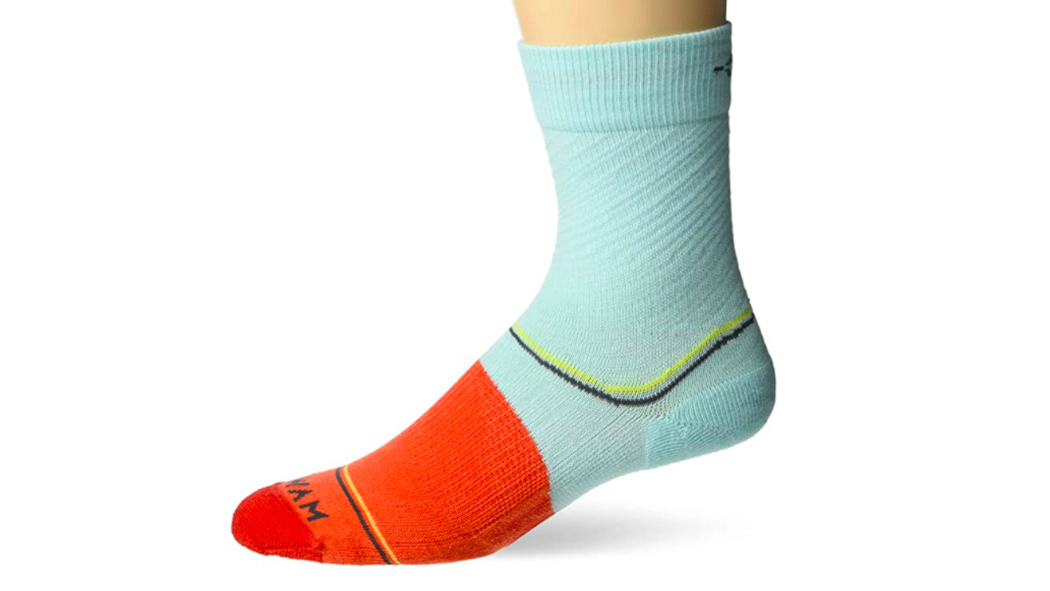
7. Wigwam Surpass Lightweight Mid-Crew
Our expert review:
Specifications
Reasons to buy
Reasons to avoid
Wigwam developed its Synchroknit sock technology with the intent of creating a contoured, no-slip fit while also strategically reducing material bulk. Soft and lightweight, the Surpass Lightweight Mid-Crew socks serve up a near-custom fit for most foot shapes with its innovative contour knit that employs gradient stitching to use less yarn than its contemporaries in the running sock arena.
Made from a synthetic blend of polyester, stretch nylon, Tencel and Spandex, the SynchroKnit Surpass socks have an elastic, form-fitting construction with a double-Y heel pocket design that envelops the rearfoot. Our expert tester Pat found that "it provided noticeable arch support, modest padding and a seamless design in the unrestricted forefoot".
The best minimalist trail running socks
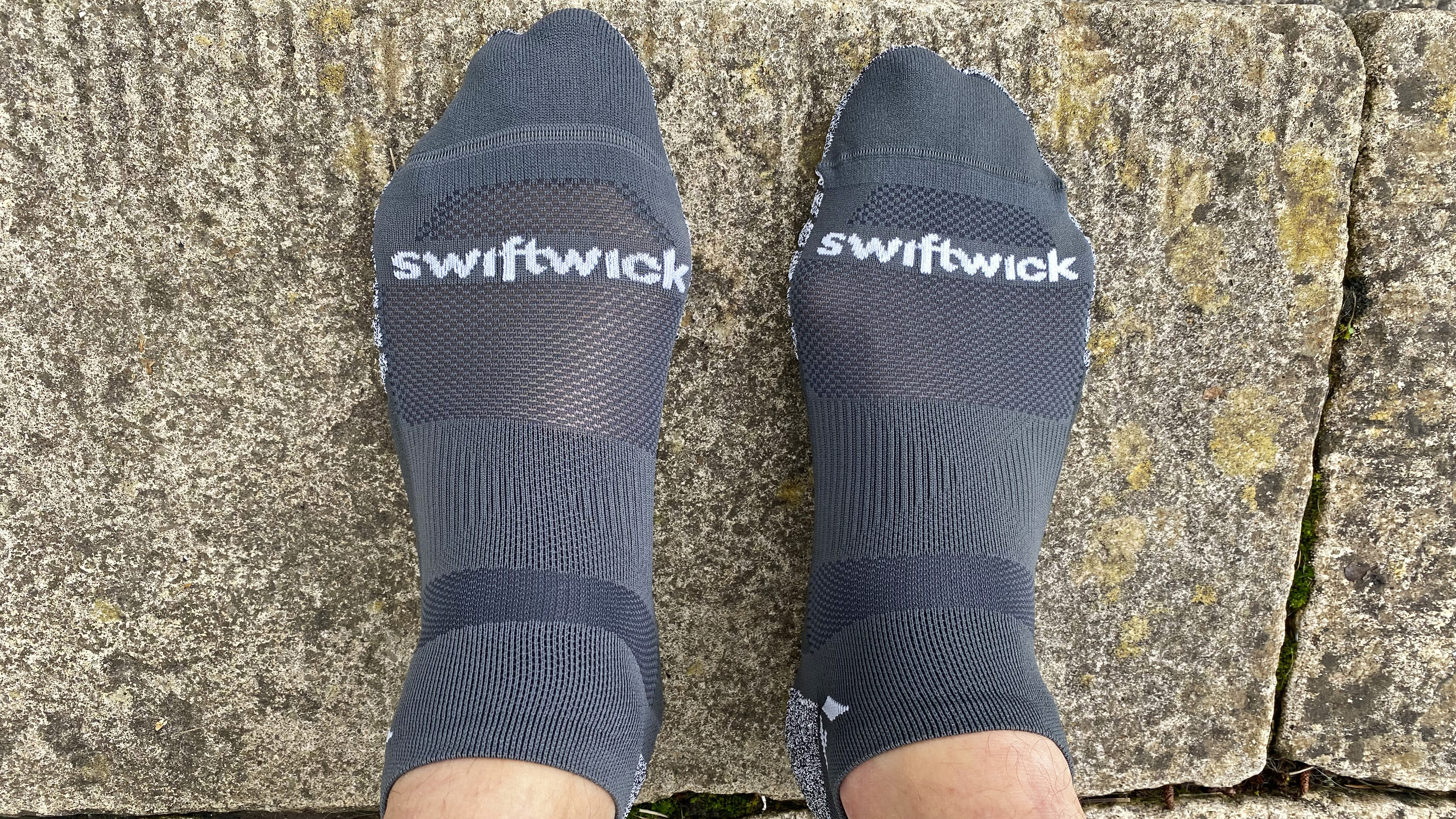
Specifications
Reasons to buy
Reasons to avoid
Swiftwick guarantee their socks are the best you will ever wear. That’s a bold statement indeed, but there's admittedly a lot of tech going on here for such a little garment. The Flite XT Zeros are a very low-cut, medium-cushioned sock designed for running and other high intensity activities in summer. You can, of course, wear them whenever you like, but across the top of the foot are three bands of mesh that made them "highly breathable and quite cool to wear in warm weather," according to our expert tester, Pat.
The socks feature AnkleLock Technology, consisting of a layer of highly elastic material that wraps around the ankle, providing support during the repetitive movements that runners execute when pounding the paths and trails. Elsewhere, a fiber called GripDry is woven into the heel and forefoot of the sock – comprised of nanofibers. On test, this supplied decent grip and we experienced very little slippage.
All this is blended with Swiftwick’s signature Olefin fiber, which wicks moisture away. By minimizing foot movement within your shoe and keeping your skin as dry as possible, these socks lower your chances of suffering blisters and rubbing and we emerged from our test period blister free. These are definitely not cheap socks, but you’re paying for the research and the tech.
Read our full Swiftwick Flite XT Zero Tab trail running sock review
Trail running socks comparison table
Socks | List price | Materials | Length | Compatibility |
Darn Tough No Show Tab Ultra-Lightweight Merino Wool socks | $16 (US) / £17 (UK) | Merino Wool (48%), Nylon (48%), Lycra Spandex (4%) | Ankle (no show) | Best suited to trail and mixed-terrain running in warmer conditions |
Balega Blister Resist Quarter Running Socks | $15 (US) / £15 (UK) | Drynamix Polyester (49%), Mohair (16%), Wool (16%), Acrylic (8%), Nylon (3%), Microfiber (3%), Neofil (3%), Elastane (2%) | Ankle crew | Trail running, endurance events |
BAM Technical Bamboo Running Socks | £16 (UK) | Bamboo viscose (40%), Merino Wool (10%), Recycled Polyamide (37%), Polyamide (11%), Elastane (2%) | Ankle | Trail and road running, plus summer walking and general use |
Injinji Outdoor Midweight Crew NuWool toe sock | $21 (US) / £24.50 (UK) | NuWool (43%), acrylic (43%), nylon (12%) Lycra (2%) | Crew | Excellent for all trails in any conditions |
1000 Mile Fusion Socklet Repreve 2024 | £14.50 (UK) | Repreve | Ankle | Road, trail and mixed-terrain running, plus walking and general use |
Sidas Trail Protect Socks | £21 (UK) | 51% polyamide multifilament, 41% polyamide, 4% elastane, 3% silicone, 1% reflective yarn | Crew | All running and hiking – road, trail, ultra |
Wigwam Surpass Lightweight Mid-Crew | $19 (US) / £19 (UK) | Polyester (49%), stretch nylon (38%), Tencel (7%), spandex (6%) | Mid crew | Trail and mixed terrain running |
Swiftwick Flite XT Trail Zero Tab | $19.99 (US) / £34 (UK) | Nylon (62%), Olefin (21%), Polyester (13%) and Spandex (4%) | Zero (ankle) | Trail and mixed-terrain running, plus summer walking and general use |
Meet the testers
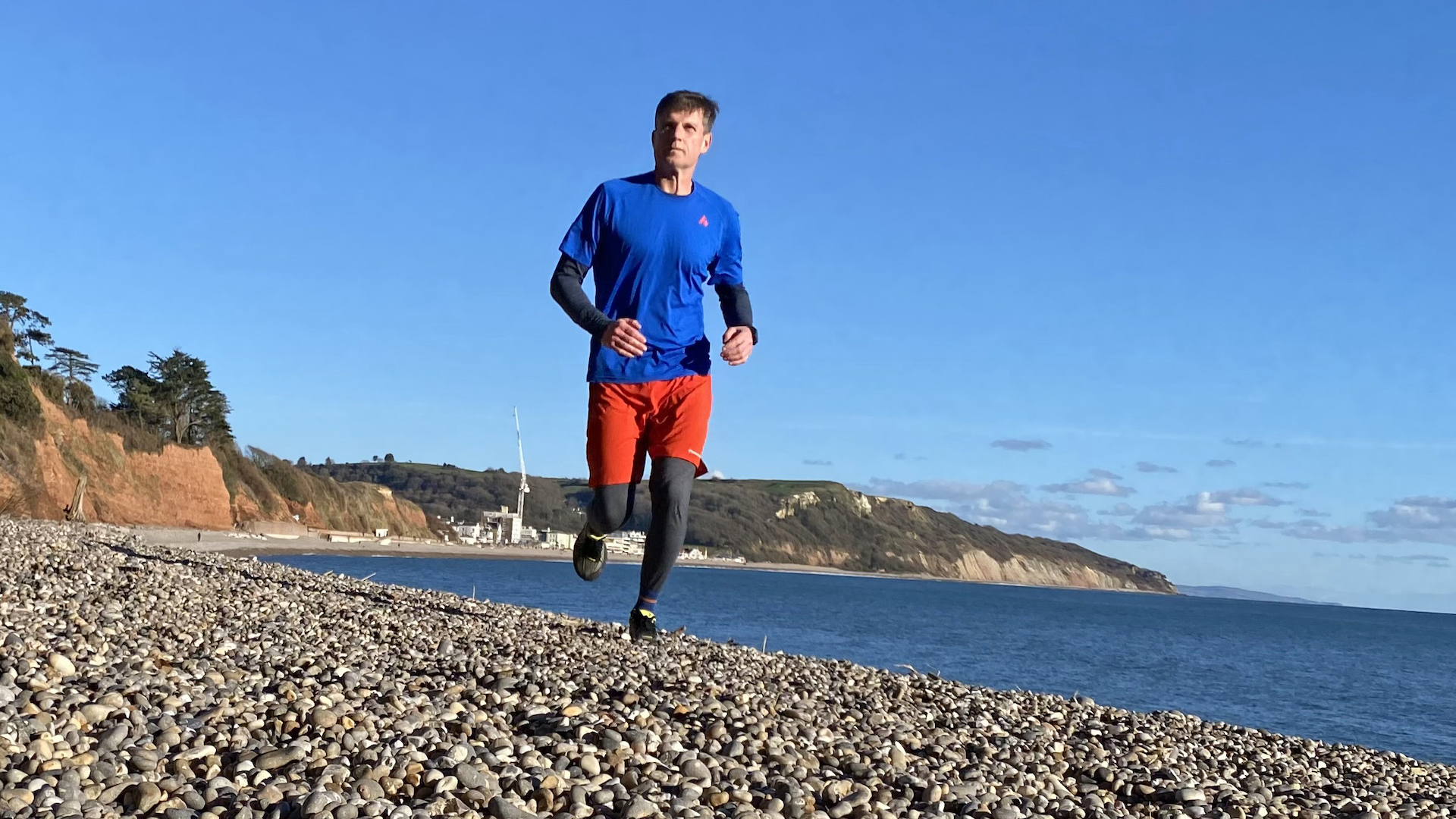
Our consulting editor Pat is one of our top gear experts. He lives in sunny Devon in England's south and often takes to the coastal trails or heads on a run inland to explore the East Devon Area of Outstanding Natural Beauty. He once set (short-lived) speed records on Australia's highest peaks and New Zealand's great walks.
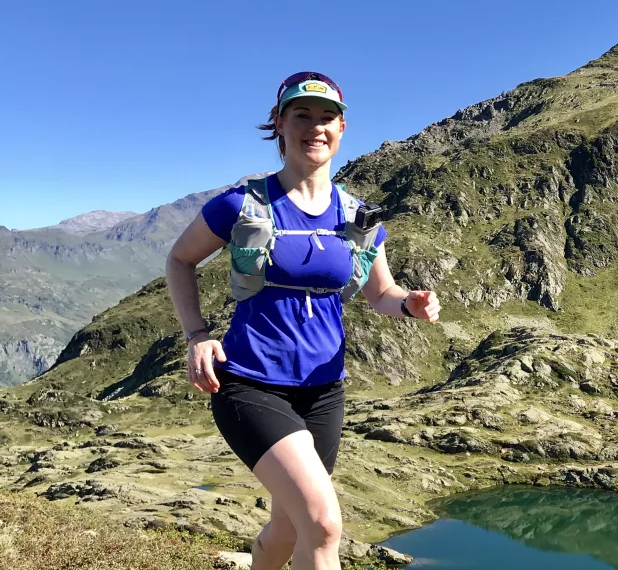
Claire is one of our leading trail running experts. The co-founder and former editor of Trail Running magazine now runs her own YouTube channel and loves nothing more than hitting the trails. She's tested shed loads of trail running gear in her time and knows what makes a quality pair of socks.
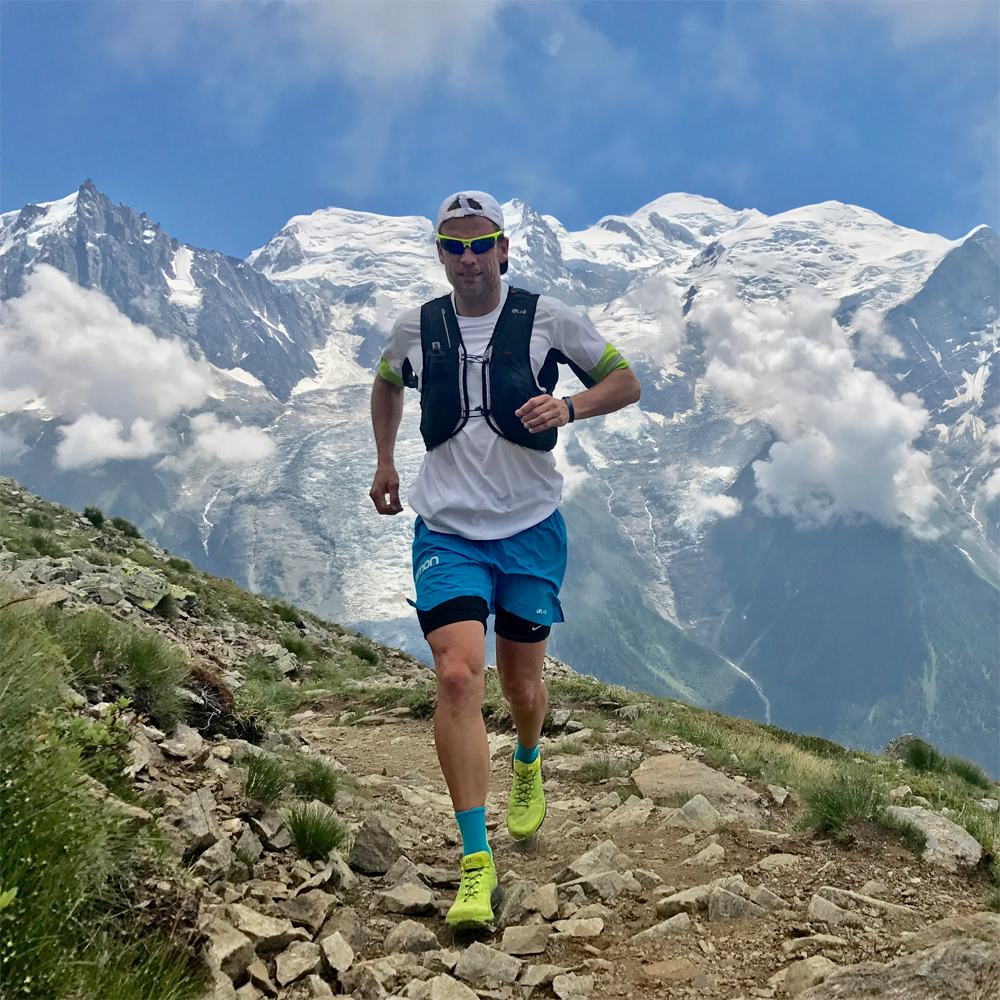
Based in Boulder Colorado, Brian is a lover of big outdoor adventures and the longer and crazier the run, the better. He's completed four Ironman triathlons, as well as numerous marathons and ultra-distance running races in both the States and Europe. Needless to say, he knows a good running sock when he sees one.
How we test trail running socks
Our reviewers test trail running socks on trails in a range of environments and conditions, while wearing various types of trail shoe. Features (including height, thermal properties, style, breathability, materials, next-to-skin comfort and support) are tested against claims made by the brand, and we assess factors such as value for money, durability, functionality and environmental impact.
How to choose the best trail running socks for you
Feet are the single most important part of the body for runners, and even if you’re into ‘barefoot’ running (see: What is barefoot running?), how you treat them and what you clad them in is vitally important. Trail runners look for a slightly different set of features in a sock than their road running cousins, because of the gnarlier terrain and increased potential of encountering wet, muddy and generally more challenging conditions.
The other thing to bear in mind when you start trail running is the possibility of brushing against stinging flora and biting fauna, which can be mitigated with a pair of the best running leggings.
The best trail running socks tend to take the key features of quality hiking socks but place emphasis on being lighter. Following are some factors we recommend taking into account to help you choose the best trail running socks for you.
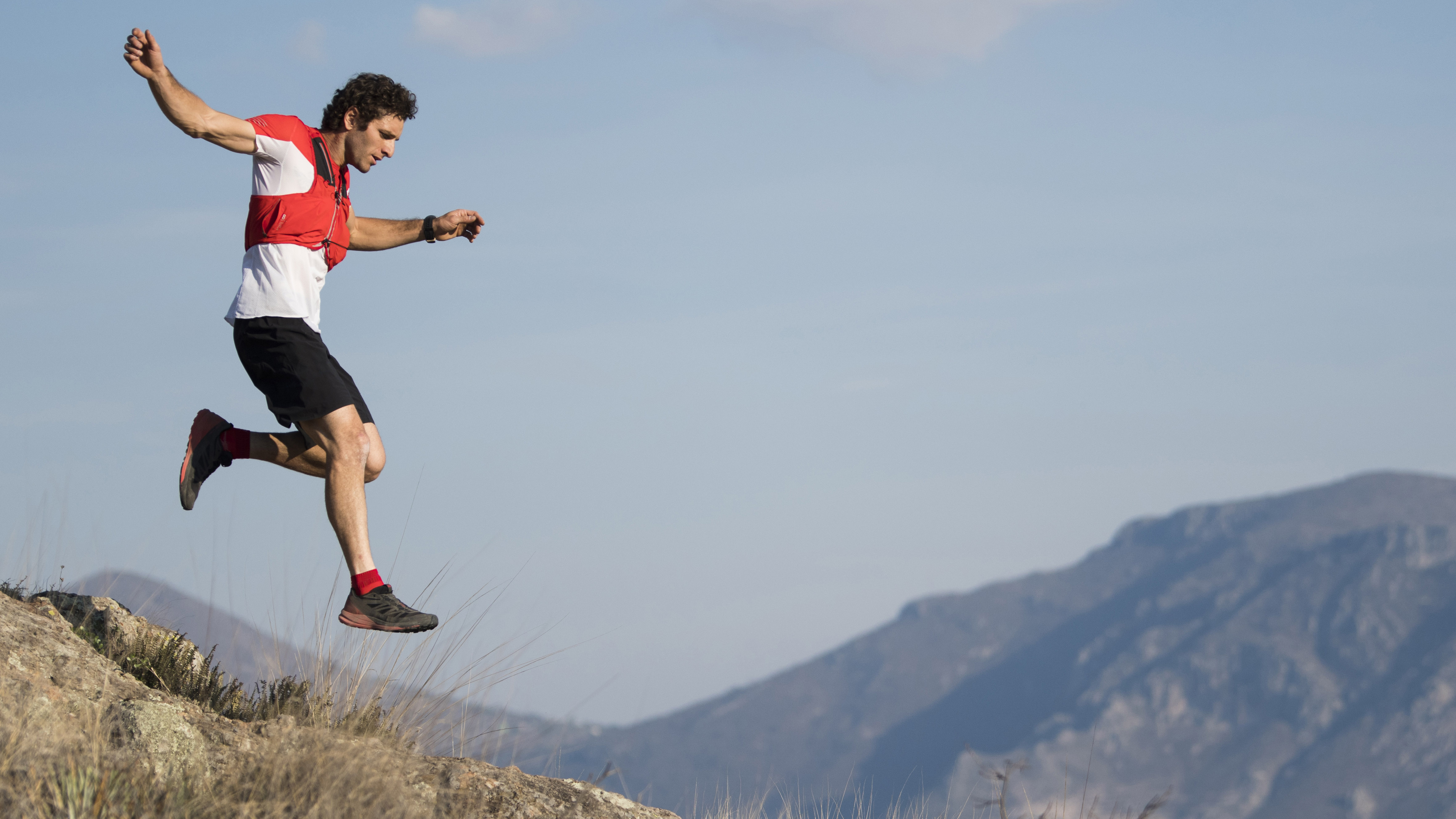
What materials are trail running socks made from?
There’s a lot to ponder under this heading. The best trail running socks are breathable, warm (when they need to be), wick sweat away, last for a good amount of time without stinking your sock draw out, look ace and are good for the planet. It’s hard to get all of these qualities in one sock, though, because materials all offer different qualities.
Natural fabrics such as wool and bamboo boast great thermal qualities, wick well, feel great and don’t pong (too much). They're also environmentally friendly, partly because they’re grown and not made as a byproduct of the fossil fuel industry, and partly because they biodegrade at the end of their life.
So what's the downside? Well, they’re often not as durable as socks made from manmade materials. Cotton feels lovely in summer, but offers no warmth whatsoever when it’s wet and cold outside. Synthetic poly products dry incredibly quickly, still perform when wet and last for ages. In fact, they’ll outlive all of us. However, they don’t feel as nice next to your skin and one day they will take over the entire planet if we keep buying them.
The best choice really is to go for socks made with a mix of materials – although these can be more pricey. If you run trails regularly, it’s worth getting a garment that will make that experience more enjoyable.
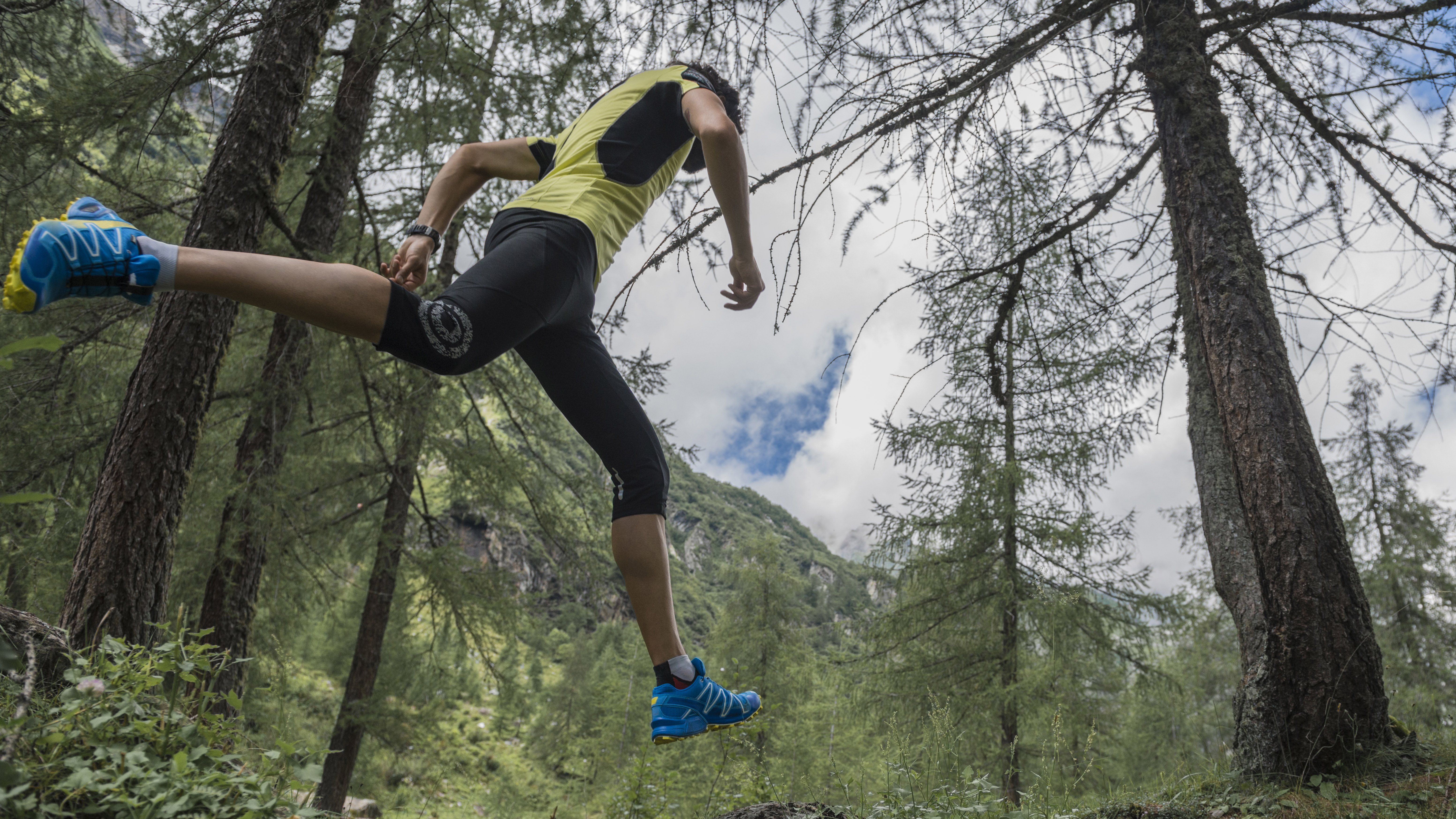
How long should trail running socks be?
You need to consider seasonality here, and the kind of terrain you are running through. Obviously, a longer sock is great for cold weather runs, which are more endurable when you’re better covered up. They also provide more support for tendons, joints and muscles and protection against prickly and stinging plants, and little nasties like ticks (also see: How to avoid tick bites). But if you’re running open or sandy trails in mostly good conditions, an ankle sock or socklet can be the most pleasant choice.
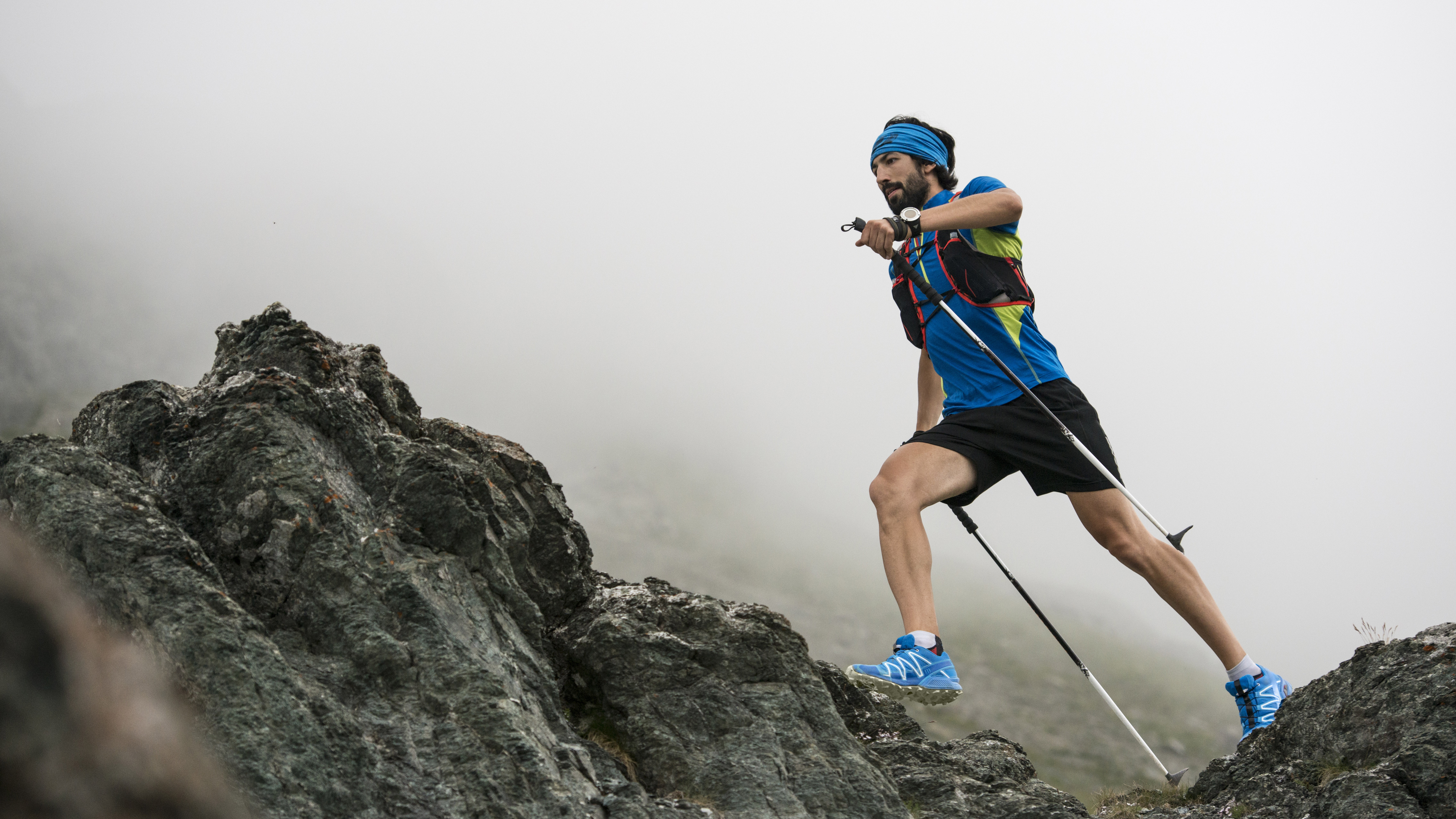
Should trail running socks be thick or thin?
The best trail running socks offer that little bit extra, in terms of protection for the various long-suffering parts of your foot against the stresses of repeated foot strike when running, and the constant chafing and wearing a trail shoe can cause. A bit of cushioning on the heel, toe area, sole, ankle, and around the Achilles tendon can really make a difference. So, thicker socks are better for protection, though for shorter trail runs in summer, a thin sock is preferable.
These elements can increase the price of the sock, but if it’s going to prevent blisters and blackened toenails, it’s definitely worth it. If you're heading out on an ultra run (What is ultra running?), this added protection can be the difference between success and failure. Thicker material in these areas will also increase the durability of the sock, so you’ll get your money’s worth in the end.
Should I wear special socks for cold and hot weather?
As well as providing additional padding for key parts of the foot, thicker running socks are also warmer, making them well suited to colder weather.
A thinner running sock tends to be more breathable and is, therefore, better suited to warm weather runs in summer.
Another thing to consider is waterproof running socks, which are a good shout for adventures where you know you feet would otherwise get wet. The downside of waterproof socks is that they tend to be less breathable.
How long do trail running socks last?
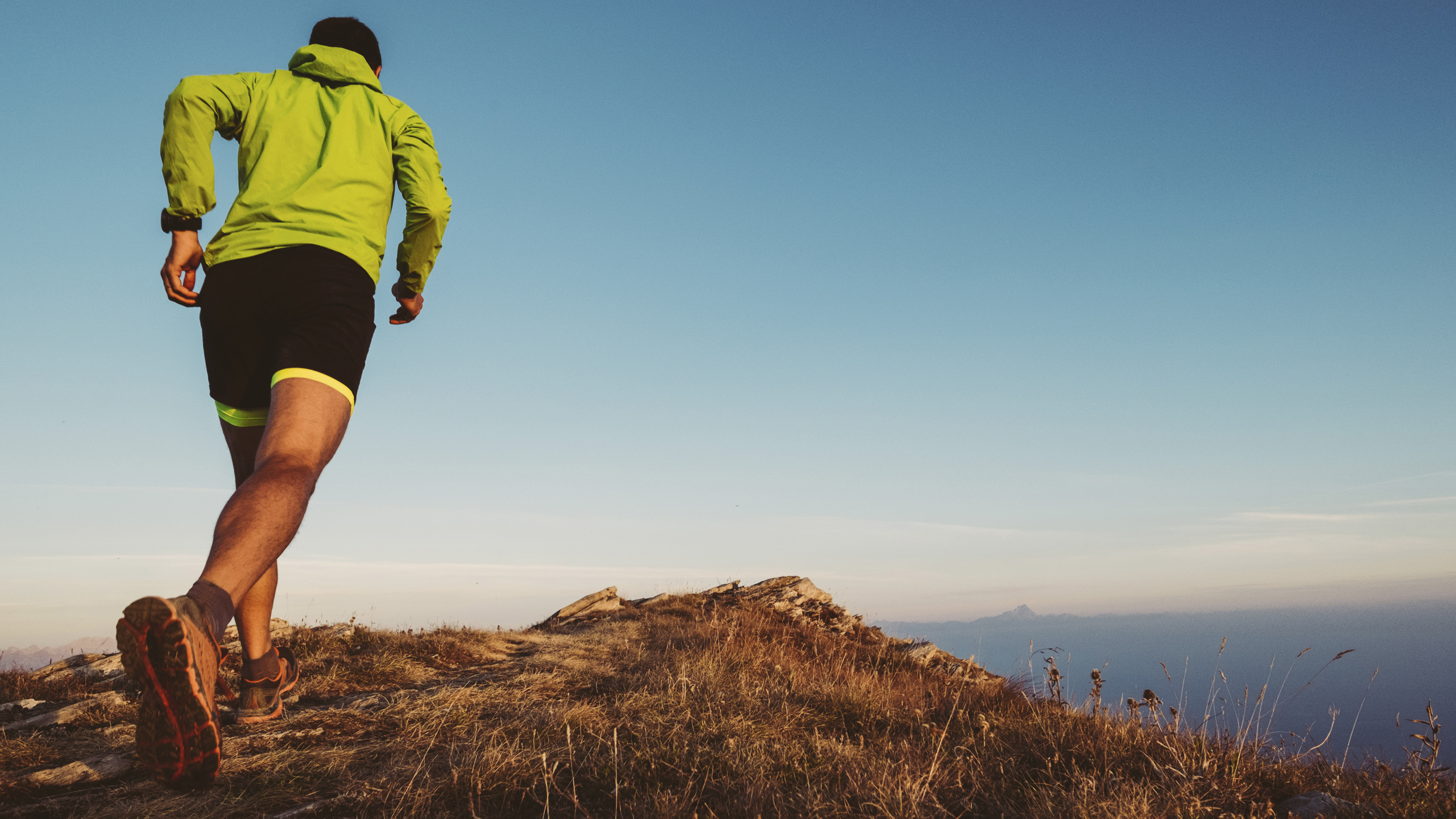
Repeated wear and multiple wash cycles will eventually wear down your running socks, lessening the cushioning and stretching their elasticity. This can lead to issues with blisters, as well as a greater injury risk. How long it takes an individual pair will depend on the quality of the original sock and how often you run in them. Manufacturers like Darn Tough believe their creations are so durable, they offer a lifetime guarantee!
Of course, at some point, your socks will become thread bare. We'd recommend replacing your sock after around 400 to 500 miles of running, or if the wear and tear on your pair is too much to bear. However, please consider the environmental impact of your decision before you decide to replace you current pairs with new ones. When you do, make sure you recycle, rather than bin, the fabrics.
What other design elements do trail running socks have?
When a sock has left/right specificity, it implies that each sock has a more contoured fit for each foot. This can absolutely be the case, and the majority of socks covered here do include one left- and one right-footed sock. But it shouldn’t be the deal breaker that turns the best trail running sock into an also-ran – in reality, the difference feels fairly negligible. When you’re trying to get out the door for a dawn run, it can be a pain if it’s not immediately obvious which sock is for which foot.
We have put the wrong one on the wrong foot before now, and we didn’t fall over any more than usual. The exception to that rule is, of course, the toe socks, where you definitely need to get them the right way around. But you already knew that.
- Best trail running shoes: for seriously rugged terrain
All the latest inspiration, tips and guides to help you plan your next Advnture!

Author of Caving, Canyoning, Coasteering…, a recently released book about all kinds of outdoor adventures around Britain, Pat has spent 20 years pursuing stories involving boots, bikes, boats, beers and bruises. En route he’s canoed Canada’s Yukon River, climbed Mont Blanc and Kilimanjaro, skied and mountain biked through the Norwegian Alps, run an ultra across the roof of Mauritius, and set short-lived records for trail-running Australia’s highest peaks and New Zealand’s Great Walks. He’s authored walking guides to Devon and Dorset, and once wrote a whole book about Toilets for Lonely Planet. Follow Pat’s escapades on Strava here and Instagram here.
